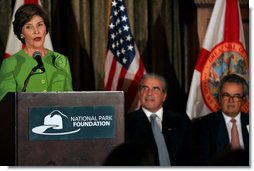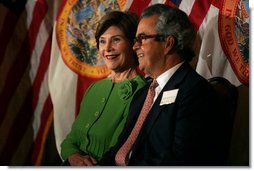|
Home >
News & Policies >
February 2006
|
For Immediate Release
Office of the First Lady
February 15, 2006
Mrs. Bush's Remarks at a Junior Rangers Event
The Biltmore Hotel
Coral Gables, Florida
7:10 P.M. EST
MRS. BUSH: I want to thank Ed and Amy Easton very much for getting our group together. I want to thank Carlos and Rosa de la Cruz, as well, for hosting us. I want to recognize Monsignor Jude O'Doherty. Thank you very much, Monsignor, for joining us. And I want to recognize Fran Mainella, Director of the National Parks. Where is Fran? There she is, over here. (Applause.)
 Vin Cipolla is the President and CEO of the National Park
Foundation, which is the philanthropic arm, chartered by the U.S.
Congress, of the National Park Services. Nancy Bechtle is the Vice
Chairman. She's right here. Kathleen Shanahan is a member of the
National Park Foundation Board, and Regan Gammon is a member of the
National Park Foundation Board.
Vin Cipolla is the President and CEO of the National Park
Foundation, which is the philanthropic arm, chartered by the U.S.
Congress, of the National Park Services. Nancy Bechtle is the Vice
Chairman. She's right here. Kathleen Shanahan is a member of the
National Park Foundation Board, and Regan Gammon is a member of the
National Park Foundation Board.
Regan and I grew up together in Midland, and we, with three other of our friends that we grew up together in West Texas with, hike every summer in the national parks. We started for our 40th birthday -- I won't tell you how many years ago, but a lot -- by floating down the Colorado River in the Grand Canyon, and then hiking the 10 miles up the south rim. And we've been in the magnificent western parks -- Yosemite, Glacier, Yellowstone. This summer we're going to Denali in Alaska to hike.
Last summer we decided to do the Grand Canyon trip again, and we invited our daughters to go with us. We all have daughters. Some of them are married but none of them have babies yet, and so we thought it might be a good year to do a mother and daughter trip, and it was.
Visiting our national parks really is a life changing experience, and the opportunity to have these magnificent American landscapes preserved and kept and accessible to Americans is very, very important.
So I want to thank each one of you for coming out tonight to hear more about the national parks and the National Park Foundation. But I also want to thank you. Some of you serve on the South Florida Parks Foundation itself, or other specific park foundations, specific foundations. And I want to thank you for what you do to make sure all of Florida's fabulous parks are kept in pristine condition, and that this tradition of visiting parks is passed from our generation to the next generation, like we had the chance to do this summer when we took our girls to the Grand Canyon.
In his State of the Union address a year ago, President Bush mentioned the Helping America's Youth initiative, which is an initiative addressed to ways we can connect our young people with their families, with their schools, and with their communities. And so, for the last year, I've visited terrific programs around the country that do everything from the National Fatherhood Initiative in Kansas City that encourages young fathers to be involved in the life of their children; to Homeboy Industries in Los Angeles, where Father Gregory Boyle works with former gang members to help them escape the life of gangs; Think Detroit, a sports program in Detroit that teaches character to children as they learn and play sports; Teen Trendsetters, that I visited here in Florida last summer that encourages high school students to mentor younger students.
 I visited many, many other great programs -- Boys and Girls Clubs
-- all over our country, but one of the very important programs that
connects children to the National Parks with their family is the Junior
Rangers program. It's an old program. It's been part of the national
parks for many, many years. And it's very important that we try to
attract children to the parks, and that's what the Junior Ranger program
does.
I visited many, many other great programs -- Boys and Girls Clubs
-- all over our country, but one of the very important programs that
connects children to the National Parks with their family is the Junior
Rangers program. It's an old program. It's been part of the national
parks for many, many years. And it's very important that we try to
attract children to the parks, and that's what the Junior Ranger program
does.
Children who live here in Florida have the chance to be outside. You have beautiful weather nearly all year. You've got magnificent parks, wonderful outdoor parks that are close to you here in South Florida. But children can also visit our national parks in the cities, like the Jefferson Memorial in Washington, Independence Hall in Philadelphia, or the Martin Luther King Historic Site in Atlanta.
One thing we know, though, is children are not playing outside like we did. Parents are afraid to let their children play out. Many, many children live in urban settings where they can't -- or there's not really a park accessible to them, or they just stay in and watch television and play video games. They choose to do that, rather than go outside.
So one of the things the Junior Rangers program does is attract children to our parks, attract them to outside sites, inform them about the magnificent landscapes that we're so blessed to have in our country.
Junior Rangers also learn about responsibility. They learn to preserve and conserve nature. They can work to keep our parks in pristine condition. And of course, we hope that we can attract real Park Rangers, that a lot of these Junior Rangers will grow up to choose to work in the national parks.
Currently, the national parks' Junior Ranger programs operate in about 286 of our 388 national parks in our country. And the best of these programs provide age-appropriate and park-specific self-guided activities for children 6-14. They can do these with their families, they can do these with their Cub Scout troop, they can do these with their church Sunday school group. Any group that might go to a national park for a day trip can let all the children who are in that group become part of the Junior Rangers program.
Fran and I have had the opportunity to swear in some Junior Rangers at the Jefferson Memorial in Washington. Last summer, we went to Minneapolis to the Mississippi River Recreational Area and swore in a group of Native American students who were learning about their own history as they toured that park in Mississippi.
Then, if you can't get to a park, there's a very terrific online version of the Junior Rangers called the Web Ranger program. And the Web Rangers mirrors the in-park Junior Ranger program. Children on their own computer at home or from a library can complete a series of activities so they can become Web Rangers. And Web Rangers allows children from all over the country and all over the world to become Junior Rangers, even if they can't physically visit a national park.
To date, the program has shown great promise for bringing the national park experience to children who do not or cannot visit the national parks themselves. It's also shown great potential to enrich and augment the park experience for children who do visit by allowing them to extend their visit when they go back home on the Web Ranger, or to prepare for their visit by getting on the Web Ranger first before they visit a park.
Tomorrow, we're going to visit Banyan Elementary School here in Miami, and their science teacher at Banyan Elementary has a special relationship with the Southern Florida national parks. She's a teacher in the gifted program. She teaches -- her name is Stella Summers. She teaches 100 students in grade Kindergarten through fifth. And she has been able to weave environmental education into her curriculum by working in partnership with all the fabulous national parks in her area.
In 1999, she started taking fifth graders on three-day camping trips, which really did change their lives. They camped in Biscayne National Park. Those chances to be outside for children, to be in the wilds where it's quiet at night, where you hear birds and animals, really do change children's lives.
And just as an example of this, the Ranger who's going to be with us tomorrow, Ranger Zapata, Maria Zapata, as a little girl her mother chaperoned her school field trip to a national park, and both her mother and Maria changed their lives. Her mother became a Park Ranger, and now Maria is a Park Ranger. Her mother is a Park Ranger, a Field Ranger, in Everglades National Park. And Maria is the Education Director for the Biscayne National Park. She's their Educational Coordinator. So you can see that that visit with a mother and a daughter changed both of their lives.
And that's what we want for the Helping America's Youth. We want parents and children, or other mentoring adults and young people, to be able to develop relationships with each other, and with our history and with our magnificent world that we've been given. And that's what the Junior Rangers program can do at its very, very best. Whole families can explore national parks together, introducing boys and girls to the magnificence of nature, and then encouraging them to spend time with their loved ones and their parents. And that's really the goal of Helping America's Youth, and the goal of the Junior Rangers program.
There are so many reasons for our children to get acquainted with our national parks, and your support of our national parks and of the Junior Ranger program can have a lasting impact, just like we've already heard today, on the lives of thousands of young people.
Now it's my pleasure to introduce one of our hosts, Carlos de la Cruz. Thank you very much, everyone. Thank you for coming out today to hear about this, and I'm looking forward to our dinner together. Carlos, thank you for hosting us.
END 7:22 P.M. EST
![]() Printer-Friendly Version
Printer-Friendly Version
![]() Email This Page
Email This Page


